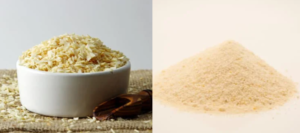Diy rice flour: a game-changer for your allergy-friendly kitchen
What To Know
- Almond flour has a similar texture to rice flour and can be used in a 1.
- Tapioca flour is also a good substitute for rice flour and can be used in a 1.
- Potato starch is a good thickener and can be used as a substitute for rice flour in sauces and soups.
Rice flour is a versatile flour made from finely ground rice. It’s a staple ingredient in many Asian cuisines and is also a popular choice for gluten-free baking. While rice flour can be purchased in most grocery stores, it’s also easy to make at home.
Why Make Your Own Rice Flour?
There are several benefits to making your own rice flour:
- Cost-effective: Making your own rice flour is much cheaper than buying it in the store.
- Control over ingredients: You can choose the type of rice you use, ensuring that your flour is free of additives or preservatives.
- Customizable: You can adjust the texture of your rice flour by grinding it to different finenesses.
How to Make Rice Flour
Making rice flour is a simple process that requires only a few ingredients:
Ingredients:
- 1 cup uncooked rice
Equipment:
- Blender or food processor
- Fine-mesh sieve
Instructions:
1. Rinse the rice: Rinse the rice under cold water to remove any dirt or debris.
2. Dry the rice: Spread the rice out on a baking sheet and let it air dry for at least 2 hours, or until completely dry.
3. Grind the rice: Add the rice to a blender or food processor and grind until it reaches the desired fineness.
4. Sift the flour: Sift the ground rice flour through a fine-mesh sieve to remove any large pieces.
Types of Rice for Rice Flour
The type of rice you use will affect the flavor and texture of your rice flour. Here are some popular options:
- White rice: Produces a mild-flavored, light-colored flour.
- Brown rice: Produces a nutty-flavored, whole-wheat flour.
- Sweet rice: Produces a slightly sweet, sticky flour.
- Glutinous rice: Produces a sticky, chewy flour.
Fineness of Rice Flour
The fineness of your rice flour will depend on the intended use. For baking, a finer flour is preferred. For thickening sauces or making noodles, a coarser flour can be used.
Storage
Store rice flour in an airtight container in a cool, dry place. It will keep for up to 6 months.
Uses of Rice Flour
Rice flour is a versatile ingredient that can be used in a variety of recipes:
- Baking: Rice flour is a popular ingredient in gluten-free baked goods, such as bread, cookies, and cakes.
- Thickening sauces: Rice flour can be used as a thickener for sauces, soups, and stews.
- Making noodles: Rice flour is the main ingredient in many Asian noodles, such as rice noodles and vermicelli.
- Coating: Rice flour can be used to coat foods before frying, such as chicken or fish.
Substitutes for Rice Flour
If you don’t have rice flour on hand, you can substitute it with other flours:
- Almond flour: Almond flour has a similar texture to rice flour and can be used in a 1:1 ratio.
- Tapioca flour: Tapioca flour is also a good substitute for rice flour and can be used in a 1:1 ratio.
- Potato starch: Potato starch is a good thickener and can be used as a substitute for rice flour in sauces and soups.
Quick Answers to Your FAQs
1. What is the best type of rice to use for making rice flour?
The best type of rice to use is white rice, brown rice, or sweet rice.
2. How do I grind the rice into a fine powder?
You can use a blender or food processor to grind the rice into a fine powder.
3. How long will rice flour keep?
Rice flour will keep for up to 6 months in an airtight container in a cool, dry place.
4. Can I use rice flour to make gluten-free bread?
Yes, rice flour is a popular ingredient in gluten-free bread.
5. Can I use rice flour to thicken sauces?
Yes, rice flour can be used as a thickener for sauces, soups, and stews.
